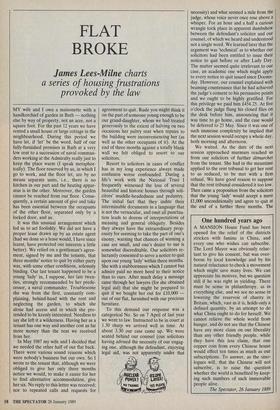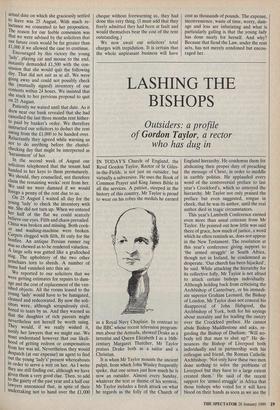FLAT BROKE
James Lees-Milne charts
a series of housing frustrations provoked by the law
MY wife and I own a maisonette with a handkerchief of garden in Bath — nothing else by way of property, not an acre, not a square foot. For the past 12 years we have rented a small house or large cottage in the neighbourhood. During this period we have let, if 'let' be the word, half of our fully-furnished premises in Bath at a very low rent to a succession of naval comman- ders working at the Admiralty really just to keep the place warm (I speak metaphor- ically). The floor reserved by us, in which I go to work, and the floor let, are by no means separate units, i.e., there is no kitchen in our part and the heating appar- atus is in the other. Moreover, the garden cannot be reached from our floor. Conse- quently, a certain amount of give and take has been essential between the occupants of the other floor, separated only by a locked door, and us.
It was this unusual arrangement which led us to act foolishly. We did not have a proper lease drawn up by an estate agent (had we done so a lease would, I have since learnt, have protected our interests a little better). We relied on a gentleman's agree- ment, signed by me and the tenants, that three months' notice to quit by either party was, with some other conditions, solemnly binding. Our last tenant happened to be a young 'lady' in, I suppose, her late twen- ties, strongly recommended by her prede- cessor, a naval commander. Troublesome she was from the first, constantly com- plaining, behind-hand with the rent and neglecting the garden, to which she alone had access and in which she pre- tended to be keenly interested. Needless to say she left it a wilderness. Having her as a tenant has one way and another cost us far more money than the rent we received from her.
In May 1987 my wife and I decided that we needed the other half of our flat back. There were various sound reasons which were nobody's business but our own. So I wrote to the tenant that, although we were obliged to give her only three months notice we would, to make it easier for her to find alternative accommodation, give her six. No reply to this letter was received; nor to repeated calls and requests for agreement to quit. Rude you might think it on the part of someone young enough to be our grand-daughter, whom we had treated generously to the extent of halving on two occasions her paltry rent when repairs to the building were inconveniencing her (as well as the other occupants of it). At the end of three months against a totally blank wall we felt obliged to resort to our solicitors.
Resort to solicitors in cases of conflict has in my long experience always made confusion worse confounded. During a life's work with the National Trust I frequently witnessed the loss of several beautiful and historic houses through soli- citors' muddle-headedness and pedantry. The initial fact that they indite their interminable documents in a language that is not the vernacular, and omit all punctua- tion leads to dozens of interpretations of meaning and general obliquity. Besides they always have the extraordinary prop- ensity for seeming to take the part of one's enemy, warning that chances of winning a case are small, and one's desire to sue is somewhat discreditable. Our solicitors re- luctantly consented to serve a notice to quit upon our young 'lady' within three months. She with a stubbornness which I cannot but admire paid no more heed to their notice than to ours. After much delay a message came through her lawyers (for she obtained legal aid) that she might be prepared to quit if we bought her out for £10,000 out of our flat, furnished with our precious furniture.
To this demand our response was a categorical No. So on 7 April of last year we went to law. Instructed to be in court at 1.30 sharp we arrived well in time. At about 3.30 our case came up. We were seated behind our counsel (our solicitors having advised the necessity of our engag- ing one, although the defendant, enjoying legal aid, was not apparently under that necessity) and what seemed a mile from the judge, whose voice never once rose above a whisper. For an hour and a half a curious wrangle took place in apparent dumbshow between the defendant's solicitor and our counsel, of which we heard and understood not a single word. We learned later that the argument was 'technical' as to whether our solicitors had been entitled to issue their notice to quit • before or after Lady Day. The matter seemed quite irrelevant to our case, an academic one which might apply to every notice to quit issued since Dooms- day. However, our counsel explained with beaming countenance that he had achieved the judge's consent to his persuasive points and we ought to be highly gratified. For this privilege we paid him £454.25. At five o'clock the judge flung his closed files on the desk before him, announcing that it was time to go home, and the case would be deferred to 25 May. Since it was one of such immense complexity he implied that the next session would occupy a whole day, both morning and afternoon.
We waited. As the date of the next session approached murmurs reached us from our solicitors of further demarches from the tenant. She had in the meantime applied to the rent tribunal to get her rent to us reduced, to be met with a firm refusal. We have good reason to suppose that the rent tribunal considered it too low. Then came a proposition from the solicitors that the young 'lady' would accept a mere £1,000 unconditionally and agree to quit at the end of a further three months. The actual date on which she graciously settled to leave was 25 August. With much re- luctance we consented to her proposition. The reason for our feeble consession was that we were advised by the solicitors that our future costs would be far greater than £1,000 if we allowed the case to continue.
Encouraged by this victory the young lady', playing cat and mouse to the end, instantly demanded £1,500 with the con- cession that she would quit the following day. That did not suit as at all. We were going away and could not possibly check the (mutually signed) inventory of our contents within 24 hours. We insisted that she stuck to her previous proposal to quit on 25 August. Patiently we waited until that date. As it drew near our bank revealed that she had cancelled the last three months rent hither- t0 paid by banker's order. We therefore instructed our solicitors to deduct the rent owing from the £1,000 to be handed over. Reluctantly they agreed while warning us not to do anything before the chattel- checking day that might be interpreted as harassment' of her.
In the second week of August our solicitors telephoned that the tenant had handed in her keys to them prematurely. We should, they counselled, not therefore claim the remaining weeks' rent from her. We said we were damned if we would forego a penny of the rent due to us. On 25 August I waited all day for the Young 'lady' to check the inventory with me. She did not turn up. When we entered her half of the flat we could scarcely believe our eyes. Filth and chaos prevailed. China was broken and missing. Both cook- er and washing-machine were broken. Carpets clogged with filth, fit only for the bonfire. An antique Persian runner rug was so chewed as to be rendered valueless. A large sofa was gutted like a gralloched stag. The upholstery of the two other armchairs torn to shreds. A number of items had vanished into thin air.
We reported to our solicitors that we Were getting estimates for repairs to dam- age and the cost of replacement of the van- ished objects. All the rooms leased to the young 'lady' would have to be fumigated, cleaned and redecorated. By now the soli- citors were, although scrupulously civil, bored to tears by us. And they warned us that the daughter of rich parents might nevertheless not herself be worth suing. They would, if we really wished it, notify her lawyers that we might sue. We must understand however that our likeli- hood of getting redress or compensation from her was nil. Nevertheless they would despatch (at our expense) an agent to find out the young 'lady's' present whereabouts in order to serve a writ on her. As I write they are still finding out, although we have given them a very good clue. Then, to add to the gaiety of the past year and a half our lawyers announced that, in spite of their undertaking not to hand over the £1,000 cheque without forewarning us, they had done this very thing. (I must add that they freely admitted they had been at fault and would themselves bear the cost of the rent outstanding.) We now await our solicitors' total charges with trepidation. It is certain that the whole unpleasant business will have cost us thousands of pounds. The expense, inconvenience, waste of time, worry, dam- age and loss are infuriating and what is particularly galling is that the young lady has done nicely for herself. And why? Because that fiend the Law, under the rent acts, has not merely condoned but encou- raged her.


















































 Previous page
Previous page